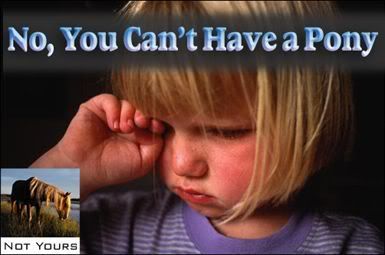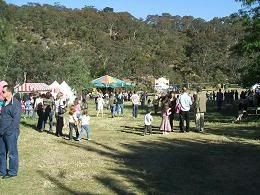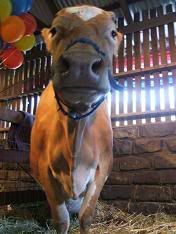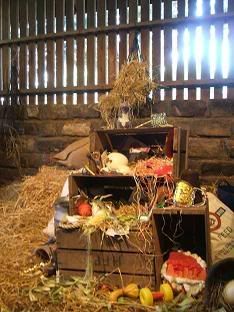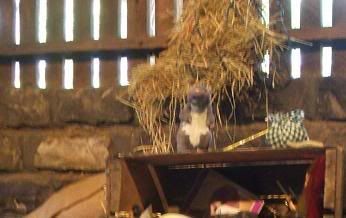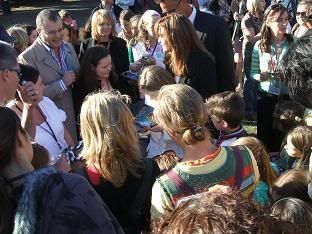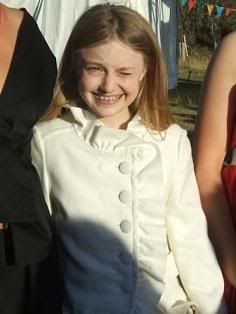Tuesday, December 05, 2006
Maximised
Way back when, I started this site in a half-hearted attempt to document my impressions of the Melbourne shows I'd caught and hadn't written about elsewhere, whether it be theatre, dance, the occasional art opening or film screening, whatever. Less reviews, than impressions. Nowadays we've reached the point where there are others far more committed and energetic and worth reading than I ever was, and you can tell the health of this burgeoning online theatre community by the fact that the last week or so has seen its very first stoush. Not exactly the sort of Wild West gunfight to have onlookers scrabbling a path through the sawdust to leap out windows in order to avoid the crossfire, but enough to generate some really interesting discussion, which certainly hasn't been resolved and hopefully, in a sense, never will be.
It all began when the very esteemed Theatre Notes published a short non-review of Theatre @ Risk's Requiem for the 20th Century, which wasn't exactly full of praise: "it seemed to me a mistake of disastrous proportions" isn't really something you'd want your work tarred with. This set off some interesting comments debating the duty of a critic. The show's director later emailed the writer and argued that it was hardly fair to make such comments about a show when, by the author's own admission, she'd left at interval. This sparked more commentary, which spread to other blogs, and also made me aware of a whole swag of new-ish theatre blogs covering Melbourne which I hadn't known about previously. Excellent, for that alone.
Anyway, as is probably obvious, I haven't really been reviewing much lately, mainly because I have been too busy but also because I figure you're all grown up now and no longer have the need to accost your sensorium with the critical equivalent of a drunk barfly trying to explain to you the show he thought he saw on the tube last night but could well be a product of his imagination and can I have one of those what are these my name'sh Born oh I already told you haha sob.
But I saw Requiem on Sunday, and I thought I'd weigh on the debate (which is probably now over, since the show is). It's worth noting before I start that in a sense, I'm not weighing in much at all, since the debate itself wasn't really about the show; it was about the duties of reviews, the rights of theatremakers, the expectations of audiences and those who read reviews, and so on. This could have been spurred on by any piece of writing.
Anyway, this isn't a corrective to Alison's original (non-)review. But as I commented there, I'm a little stumped as to how some people had such an extreme reaction. I can see how some would have felt it didn't work, or was too safe, or didn't succeed at what it was trying to do (not my reactions). But disastrous?
Huh?
The piece purports to offer a "theatrical tour through the last century"; it's more than two and a half hours spanning the first half of the 20th century, with a central plotline involving the doomed romance of a pair of lovers with uncountable cameos from historical personages flitting through their lives. It's historical melodrama on a ridiculously inflated scale.
One review compared it to the Monsterist movement in Britain - I disagree. I see it as fitting more with the literary form of Maximalism, or Encyclopaedic Narrative. I'm thinking of Thomas Pynchon - no accident since I'm making my way through his massive new novel - as well as various mammoth works by John Barthes, Gaddis, even back to Melville and Sterne. Maximalist works are long, jumbled, often overwritten, obese, crowded and messy; they usually cover great historical periods and overlap with the genre of historical metafiction, mingling fact and fiction and not really respecting any divide between the two. They often come across more as catalogues than narrative, listing events and personages without paying attention to the usual demands of plot and character; psychological depth is the first thing in the dustbin when attempting to achieve the breadth these works aspire to. Critics argue that a catalogue is hardly the stuff of great art, that taxonomy is all these things offer. But that's the point: they both acknowledge and question the human impulse to attempt to impose order and arrangement to the great carnival of human history, toppling the notion of 'progress', serving up a panoply of disconnected moments, characters of little to no lasting importance, "great" events flattened out as mere spectacle. How else to tackle the sublime and ludicrous project of attempting to summarise the 20th century?
The piece begins with clowning, a painful scene in which a Charlie Chaplin figure attempts to be rid of an abandoned baby he's found. I didn't like the scene at first, but later pondered what better way there might be to introduce not the period in question, but the idea of a tour through that period. Begin with farce. Of course. Just so we know what we're getting into.
I could go on. But I think it's apparent that my response to the show, owing as much as it does to other things I've been thinking of lately, is hardly going to be everybody else's. Which has sort of been the credos of this site: I've never tried to review a show as good or bad, as getting anything right or wrong. I sincerely believe that every production has its audience, and it's the reviewer's job to clue that audience in on the show while warning other audiences what they can expect. Sometimes that audience is limited to one or two people in a whole town of potentials; lordy knows, I've been to shows where the audience perhaps should have been limited to the writer and director. I'm saying 'reviewer' here, not 'critic'; different thing going on there. But when I've got my oversized ten-gallon reviewing hat on, I'd much rather say "I didn't get it" than "They didn't get it". And I'm more likely to try to work out what a show contained, rather than second-guessing what it lacked. But until next time...
Tuesday, November 28, 2006
Some Day
Nestled amidst the musty railway trunks, three-legged hatstands and grime-spackled bookcases of the Born Dancin' Office for Paranormal Investigations squats an old-fashioned rolltop desk devoted to research into mechanical oddities. Faded prints of steam-powered wheelchairs, eighteenth-century animatronics and automaton engineering butt dusties with giant Japanese robot technologies, furled parchments on Disney rides and a subscription to Tamagotchi Collector's Monthly. It's here you'll find a darkened pigeonhole containing all available information on one of the most successful robotic creations to emerge in recent years.
Dakota Fanning is a remarkable achievement, to all appearances a real life human child. It's only when she talks that one notices the gears and cam-shafts and flywheels which must be whirring away in there. Everyone knows that machines can't think, which is why she seems to have been equipped with a speaking mechanism produced by Hollywood media moguls, spouting flawless interview-speak with the confidence and lack of self-consciousness found only in the biggest of Tinseltown stars. She acts like an aging Katherine Hepburn in tween form. Maybe that's why the director of the new Charlotte's Web called her "the greatest working actor in the world" at the film's world premiere on Sunday. Certainly, it seemed that few, if any of the thousand-plus children in attendance were troubled by their little pint-sized Hollywood hero was a bunch of nuts and bolts. But I guess kids have always been able to identify with toys and dolls and puppets that way.
The film itself was pretty good, in an understated kind of way, but the afterparty was a scary ride into the unknown. Firstly: the buses. We were herded from the Regent that sunny afternoon into a squad of waiting buses, which felt more like school camp than anything else, kids clambering over the backs of seats, a gleeful ruckus of little 'uns who'd been sitting still for the last hour and a half and sure as hell weren't going to stay put any longer. Our coaches took us the the Collingwood Children's Farm, got up like Charlotte's Somerset County Fair, brass band, petting zoo and all.
Once there, the grownups (there were no 'adults' in this particular world) were freshened up with an endless supply of booze ferried out from lord-knows what thicket while kids mainlined bags of cotton candy, hulking golden donuts with a visible nimbus of saccharine glazing and bottomless red-cordial-infused ice buckets. Tipsy parents and sugar-soaked kiddies? Recipe. For. Chaos.
I'd had a bet how long it would take before we saw our first tantrum, and I was surprised that it took a good hour or two. Perhaps it was all the pony rides and miniature ferris wheels and carousels and fully operating lifesize Dakota Fanning which provided distractions for that time. Certainly, the animal nursery was popular, with different stalls featuring animal actors portraying the various characters in the film.
Here's Bitsy the cow, looking a little more formidable in real life.
Less successful was the lair of Templeton, the rat.
Note: if you look closely, you'll realise that THIS IS NOT A REAL RAT. Also, I'm pretty sure I saw a kid walking off across the field holding this stuffed rat later in the day.
I had a moment of perspective-sharpening after leaving the nursery to see two groups formed around separate objects of interest. I went to the smaller group, which pretty much consisted of me and about two other people all looking adoringly at this little fella, our Wilbur for the day. He's sleeping here, which, at four weeks old, is understandable.
A much bigger group was ooh-ing and aah-ing over the day's real Prize Pig, Young Miss Fanning.
I kind of found it sad that Dakota was getting so much attention because she was a) famous and b) could autograph things for people, when nobody particularly cared to appreciate the beautiful little Wilbur, who is a far more astonishing and heart-stirring creation than anything Hollywood could produce. Then again, it was Charlotte's writer E.B. White who'd always proposed that same old notion:
If you let nature play itself, it'll entertain you for the rest of your life.
Over the course of the day, I noticed that Dakota was just playing herself too, and that despite her flawless ability to emulate exactly what we imagine a celebrity to be, she's still just a 12 year-old kid having a great time. Maybe she's got a bit too much energy and enthusiasm, but with the sugar flowing on Sunday that could have been any kid there. And all of them, from the tottering toddlers to the tantrum-tossers, and even the beaming parents and coolsie blow-ins, were all pretty entertaining as themselves. Quite the cast, and no CGI effects needed. Sunny times.
Thursday, November 16, 2006
Magazine or Book or Magazine
Thursday, November 09, 2006
PITCHING IDEAS 2
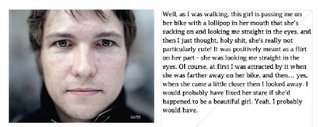
What I like about Hoegsberg's Thought Project is its unfinished nature, which is perhaps due to its quasi-collaborative method. It takes as its subject "thought", but doesn't present a rounded set of conclusions or deductions or implications: it focuses on thought (and ideas and even art) as process, not product. And I think I'm interested in the process of thought, as made evident in the narratives accompanying each photograph. They trace routes of thinking, sometimes doubling back, sometimes leaping across a chasm to end up somewhere different, but never sitting still, since I suppose that's impossible. Maybe thought is a kind of movement (a dance?) and too often we do the movement in private, attempting wherever possible to show the world only the finished pose, the final figure rather than the clumsy routine we've been through to arrive there.
Gillian Wearing's art frequently centres on the line between ordinary people's inner worlds and the faces they present to the public. I first saw her stuff a few months back at The Greatest Gallery In The World and was immediately impressed. It was in the same room as some shots by another favourite, Cindy Sherman, so I was double-chuffed. And Wearing's series of photographs which feature herself, um, wearing almost perfectly realised latex masks of other people is very Sherman-esque.

The photo sequence in question, though is part of the series "Signs that Say What You Want Them to Say and Not Signs that Say What Someone Else Wants You to Say". Wearing asked passersby to write a thought on a piece of paper, which they then held up as she took their photograph, and some of the results are fantastic exercises which question our expectations and social stereotypes.
Other works in the Wearing exhibition currently on at ACCA include a confronting and touching series of photographs of a working-class prostitute with various of her regular clients, each accompanied by a handwritten (and often barely legible) letter by the respective client, explaining his feelings about her. The notes range from the heart-rending (the old man who declares that he loves her and wishes she wouldn't sell herself for the price of a beer) to the shocking (the angry soul who seems worried that she calls him a dud in the sack, and soons begins a horrible diatribe against her).
Something about the method here prevents the series from simply turning into another exercise in voyeurism, in prurient gasping "look how they live!" sensationalism. I think it's the way the subjects are given the opportunity to express themselves, without editorial intervention from Wearing, though as the framer she does have a lot of involvement in that sense, of course. And it's very interesting (and I'd venture to say quite deliberate) that the woman in question doesn't get the chance to respond to these writings, or express herself. We don't get to know her at all. Do we get to know the men any better?
I typed in this web address today and came across a very sweetly sad little site - a blog from the US covering two and a half years of a relationship (between 'Jennifer' and 'Alan'). It was set up so that they could write how they really felt to one another, though reading it, I got the feeling that they'd be pretty open in real life too. Who knows. But charting the course of their ups and downs, the blog makes for fascinating reading, especially if you just click on random dates. There are times when they seem wildly, passionately in love, but other entries hint of a cooling off from one party or another, or a feeling that something is being held back, or that something is being covered over.
The saddest thing is the way it ends on Sunday July 25, 2004. Jennifer is the last to post, and her final line comes from nowhere: "i feel so sad and forlorn! where are you when i need you?!"
And that's all she wrote.
Unfinished, peripatetic, ideas-based, half-baked, processive, meandering: something seems to link all of these things, but I'm not sure whether one adjective will really nail it. And of course it's a family resemblance, not a single feature.
But it's hard enough finding work that I like, so I thought I'd start one myself, or at least throw out a net and see what it brings in. So here's a little pointer to a project I'm starting which will be a magazine called Book, or perhaps a book called Magazine.
There will be 52 copies. Each week, I'll post a copy of a blank book (each book will be different) to somebody, who will contribute whatever they like to it. Writing, obviously, and drawing and painting and music and cut-outs and pasted objects and origami and coffee stains and pieces torn out and lamination and essays and plagiarism and photographs and stencils and so on, it'll all be welcome. Every edition will have its own theme, though these can be interpreted widely. It's a pretty open brief. And when its recipient has added (or subtracted) as much as they want, they'll post it on to the next person.
The final results will vary in quality, I imagine, but in toto should be fun to compare. Who knows?
I'll track the various copies across the world via the website, too, and people will be able to post impressions on the developing books as they recieve them.
If you'd like to be added to the list, just keep an eye on the site for more info.
Wednesday, November 08, 2006
PITCHING IDEAS
I spent last night workshopping some of Shakespeare's monologues with a friend who has an audition with Bell Shakespeare. Said workshopping mainly involved sitting on a darkened oval as he bellowed things from the other end of the cricket pitch like Shane Warne in an excited moment.
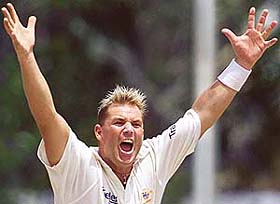
"What a rogue and peasant slave am IIIIIII!!!"
A very fine bottle or two of red was involved, sponsored by an unexpected double win on a $2 sweepstake (his win - I remain a loser). And thrice did the field with tall terraces bound echo with a throaty cry of "vengeance!" Most of the time he played with much more nuance, however, and it was unexpectedly thrilling to put myself back in the position of director (or, I suppose, dramaturg) as I offered comments and criticism and "do it again like this" and so on.
In honour of this occasion (which I now dub the Inaugural Annual Yell Shakespeare on the North Fitzroy Oval Festival - all invited for the 2007 event) I will today completely depart from my usual performance focus by taking a meandering, rhizomatic journey through some of my favourite art of recent times. Art, as in pictures and stuff, or at least a bit like that. I'm not really that well-versed in art, and I'm not even sure I know what I like, but I do know what makes me feel different and deserving and such; the sort of thing that has me thinking "well, I may not know why I exist, or anyone else, but I'm very very glad I do right now."
IDEAS CATALOGUE
A while back I interviewed VCA grad and ACCA employee Gabrielle de Vietri about her Ideas Catalogue, and I'm really very all over it for the awesome and utterly charming idea that it is. Briefly, de Vietri assembles a catalogue of unrealised projects from people around the world, which are then put on sale, much in the style of an art catalogue. Prices range from a few bucks to a few thousand, and the Ideas themselves are in turn funny, provocative, offensive and sublime. And some are, to gurgle up the old cliche, so crazy that they just might work.
For example, I like the first issue's BREAK-UP INDICATORS, a pair of walll-mounted metres that can be used by the respective members of a couple to display "a percentage of likelihood of staying together." Useful, huh? And "at 0% and 100%, the adjustable knob could lock, as these are stages that imply unchangingness." I like it. $120.
Or, for the literarily/statistically inclined, why not pick up ALL THE POSSIBLE STORIES (also from Issue One - we're now up to Two)? The Idea calls for its owner to "Find every story that can be written in the English language in 1000 letters," and goes on to explain just how this can be accomplished. It's worth someone doing, though clearly I'm too lazy/erratic to try it myself. $620.
MORE IDEAS

Miranda July's Me and You and Everyone We Know was quite the indie hit flick a little while back, and she's an accomplished artist in all kinds of forms. She's one of the people behind the website Learning to Love You More, which my sis put me onto, and which features "work made by the general public in response to assignments given by artists." These assignments are things like "Make a portrait of your friend's desires" or "Interview someone who has experienced war" or, my favourite, "Take a picture of your parents kissing". The results are posted on the site.
THOUGHTS
Simon Hoegsberg is the guy behind the Thought Project - a photographer, he gave himself the task of stopping ordinary folk walking the streets of Copenhagen and asking them what they were thinking about at precisely that moment. The photographs themselves are gorgeous; even better, though, is the fact that most of the people he stops are sweet, complex, articulate souls who open up, just for a moment, a doorway into their minds and lives. All through a few words. Take this one:
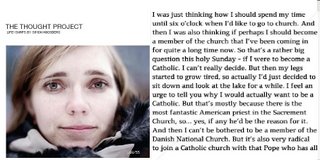
... you can read the rest of this (and the many others) at Hoegsberg's website.
I had a lot (LOT) more written, which I've just lost. That's how the internet and me get along, I guess. I'll try to re-write it tomorrow, or not.
Tuesday, November 07, 2006
INFREQUENTLY ASKED QUESTIONS

Sometimes I wake to find questions crowding in like cats batting their angry paws at my bedroom door. I usually realise quite quickly that what I have taken to be questions are, in fact, cats batting their angry paws at my bedroom door, but I find the easiest way to ignore this kind of feline spam mail is to imagine that they are questions, rather than hungry and irksome creatures over whom I have some responsibility. And so I retreat to an idyllic corner of my mind (I call it "Christopher Walken's House of Pantaloons") and ponder these queries, which are to me a kind of frog chorus.
For instance.
DOES EVERYONE YOU EVER KNOW READ THE SUNDAY PAPER?
It would seem so, yes.
WHERE HAVE YOU BEEN? YOU NEVER FINISHED YOUR ARTS FESTIVAL WRAP UP.
I know. There were a few shows I didn't get to mention (Mantalk, La Clique) but they weren't traffic-stoppers so I don't feel too guilty. Also: Cairns.
WHY WERE YOU IN CAIRNS?
I cannot say. But if it were a James Bond film, it would most decidely have been one of the early 70s ones, since it involved a contraption which looked like this:

It also involved a man explaining to me the finer points of cognac appreciation, an afternoon in an open air spa with cocktails and lovely ladies, fast boats, scuzzy underwater photography and, well, Cairns. So definitely a 70s number.
WHAT ELSE DID YOU DO?
I accidentally licked an old lady's finger while trying to lick an ant. I swam in a watering hole with a turtle. I was introduced to a kind of fruit which weighs about 50 kilos. And I ate more food than I really should have.
WAS IT FUN?
Mostly. Almost entirely. Here's an image-based approximation of my feelings over the whole trip.


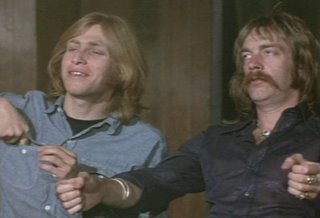
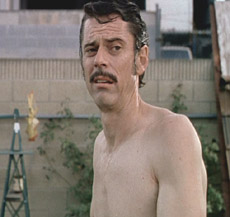
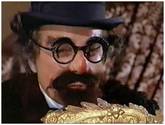
IS IT TRUE THAT ONE IS STILL WHAT ONE IS GOING TO CEASE TO BE AND ALREADY WHAT ONE IS GOING TO BECOME? THAT ONE LIVES ONE'S DEATH, AND DIES ONE'S LIFE?
This is a watering hole.

HOW'S THE NEW HOUSE GOING?
Great guns. I now sit of an evening upon my grand balcony, gazing through smug, half-lidded eyes at the glory that is my dominion. Or at least the park opposite. Also they make good coffee on the corner.
CAN WE ALL COME AND SIT ON THE BALCONY?
Of course, it'll be a grand old time and we can toast future happiness and tell tall tales and also just more ordinary stories too (not tall).
TELL US A STORY, OH WISE ONE.
Well, I recently heard a story from someone who, as a child, was quite the enterpreneur. She grew up in Hong Kong and was intrigued by the economies of scale involved in the whole tooth-under-the-pillow thing. At a local feast, she found some pigeon's heads discarded after a cook-up, and figured that a beak was worth at least a few teeth. A week later her parents complained to the housekeeper about the godawful smell coming from her room, and it didn't take long before somebody lifted her pillow to reveal the little row of bird heads festering underneath.
Huh. Kids.
CAN YOU RECOMMEND A GOOD BOOK?
I'm reading Bulgakov's The Master and Margarita right now, and it's very, very good.
HEY WHILE WE'RE HERE, CAN WE BORROW SOME MONEY?
What, so you can blow it all again, like last time? Geez, is that the only reason you came over? I'm not a cash machine.
WE WERE JUST ASKING.
Well if that's all I am, fine. But I don't have time for your stupid panhandling; here I am holding down a full-time gig, fending off the creditors and jetting up and down the coast, while spending the rest of my time with my forehead pressed against the steering wheel of the '78 Falcon I bought thinking it would give my life "vim", listening to Harry Nilsson's Without You on repeat and wondering exactly what would happen if I just closed my eyes and floored it. Basically, I'm really busy.
WHAT DO YOU WANT FROM US?
Nothing! I just want to sit here out on my balcony, reminiscing about tropical Far North Queensland and ignoring your stupid scratching at my door. Is that too much to ask? So quit your mewling and let me get back to getting back. Oh wait.

Thursday, October 26, 2006
Sounding Out (Melb Arts Fest pt 8)
For someone with so little control over that register, however, I've found over the years that other's voices really stick with me. I used to delude myself into thinking I had a good memory for names, and when that proved wrong I went for the obvious "faces" option, but really, it's turned out that I have no particular facility for remembering either. Voices, on the other hand, I do recall rather well. If I think of someone I once knew, I can always summon up their voice. Can everyone do this? I hope so. I can imagine that, in our visual/textual culture, when we think of another person we rarely do so by conjuring their sound. If you're like me, though, and find it pleasurable to drag a memory out of the old toybox and enjoy it for itself, passing it from hand to hand, feeling its weight and the way gravity pulls at it, you could do worse than trying this kind of recollection on the aural level. If you know me, try to recall my voice.
Two of the shows I've enjoyed most during this year's festival have been dependent on the power of one person's voice. They're vastly different pieces, but each offered a sole speaker throwing words into the void, hoping that they would find some purchase.

William Yang's Objects for Meditation sounds as dry as can be, on paper at least. One guy standing alone on a stage, talking for an hour and a half about, well, stuff, while twinned projector screens behind him are filled with photographic images illustrating said stuff. It works, though. Yang is a charming orator, speaking in a very emphatic, slow style, and taking us on an eclectic oral journey encompassing decades of his life, his travels, his sexuality, his family, his pseudo-Daoist philosophy and the relationships between all of these things. It's an artfully artless performance, seeming on the surface to consist of little more than the peripatetic ramblings of a worldly (and wordy) soul, but hinting at great correspondences between the various aspects of a person's existence. It's also a very humble work; describing his attraction towards water, he sums this up well. Water seeks out the lowest places, but it carves its way through mountains. Water's softness slowly defeats hardness.
There's a great deal to ponder over in the narration, and it's the kind of piece that slowly settles into your mind over a while, well after the show has ended. It kind of reminded me of W. G. Sebald's writing, which I've never felt I truly understood, but which nonetheless gets my mind going in all kinds of directions. Which, I suppose, is a kind of understanding in itself.
Yang's an engaging speaker, but not quite engrossing. Marie Brassard, on the other hand...
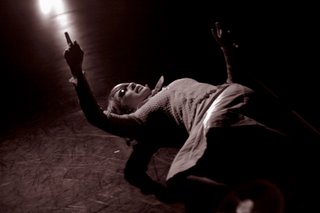
Brassard's Peepshow really is my festival pick for 2006. I didn't go in with particularly high expectations, since the idea of a solo show that boasts a performer whose voice is electronically altered screamed 1979 performance art nightmare. How wrong I was. Brassard is an actor who holds her audience in the palm of her hand, but uses that power conscientiously. She takes us to places we might not be comfortable with (and god knows, her climactic thigh-carving bit is an exercise in Deleuzian panic-button-pushing) but also offers a shag-pile carpet to fall back onto when all's said and done.
Well, all might be said, but it's never done; not if a show is worth it. Peepshow is worth it. If you only see one show this fest, make this the one. If not: sorry. Come back next week to read more.
Monday, October 23, 2006
History by Request (Melb Arts Fest pt 7)

I've been asked by the irrepressible Ausculture Jess to post on a matter dear to my heart, about which she has been subjected to countless rants (well, one, and it wasn't very rant-like, and only lasted about a minute) and of which she would like to read more in a textual online form, since this will make it authoritative and quotable and perhaps true. Be warned, however: Jess does live in a barn and is periodically attacked by cats of various sizes who may or may not be under my mental control. She's moving out of the barn soon, though.
So: today's lesson is a quick primer in the subject of Historical Disco. Not disco which has been imbued with an historical patina now that we're several decades on from that colourful era of the late 70s and early 80s; no-no, sweet silly children, how innocent you all are! Take your places, now, and ready your notebooks. Afterwards, if you are good, there will be singing.
Disco was much reviled during its heyday, and its often bland excesses and vacuous hedonism leading, among other things, to the rise of seemingly-antithetical musical genres such as punk, mainstream metal and 80s white bloke rock. A rise of music which offered an antidote to disco wasn't just a taste thing, however, since it played upon a rich vein of social tensions only hinted at in the overt rhetoric. For many, disco was a feminine realm (and by implication, feminising, since it's always been ok for chicks to boogie, but John Travolta's uplit white-suited gyrations just ain't on, man). The hairy rock of Bruce Springsteen or the frenetic pogo-ing of Pistols fans didn't upset the boundaries: no chance of a guy being misconstrued, is all I'm saying.
Same with instrumentation: there's long been a divide between 'real' music (written and played by the band itself) and 'plastic' music, performed by artificial figureheads whose strings are pulled by some savvy Svengali in the studio. The issue of keepin' it real, of course, took on extra dimensions right about the time disco died, with the 'realness' of rock's talented white singer-songwriters suddenly challenged by the sample-heavy sequencer-ridden 'reality' of West Coast gangsta hip-hop.
"Disco will never be over. It will always live in our hearts and minds. Oh, for a few years, maybe for many years, it will be considered passe and ridiculous. It will be misrepresented and caricatured and sneered at. People will laugh about John Travolta, white polyester suits and platform shoes . . . Those who didn't understand will never understand. Disco was much more and much better than all that."
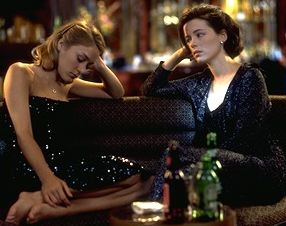
Impassioned and entirely unironic words from the classic disco film, The Last Days of Disco (released around the same time that the atrocious Studio 54 was stinking up silver screens everywhere). But why care? Why give two bits about a dance music genre which merely gave upwardly mobile white narcissists a chance to pretend they could dance?
Historical Disco might not answer that question, but it's pretty awesome anyway.
Every genre of music has something like it, I'm sure; if not quite its mirror, at least its penumbra, that grey area which unites the mode with its opposite. Literary Rock/Pop, for instance, Kate Bush's "Wuthering Heights" or the Velvet's "Venus in Furs" spring to mind. Or that style of funk/soul dedicated to marriage and making it work, long-term.
Historical Disco attempts to combine funky cheese-laden melodies with educational content, for no reason scientists have been able to discern so far. The undisputed heroes of the genre are Boney M, mainly due to three things: a) they were the creation of disco pioneer Frank Farian, who was German (Historical Disco invariably comes from Germany, b) they released not just one, but a swag of historical songs, and c) they were kind of the only group to actually record anything resembling historical disco.
Now, I know, I know, this last claim is a bit dubious. After all, Dschinghis Khan's "Moskau" often competes with Boney M's "Rasputin" as the most prominent HD title. But as most people realise, while Dschinghis Khan were kind of historical (if you count faux fur hats and bad Russian dancing as somehow historical) the song itself is just, you know, about Moscow. Not Moscow way back when, or anything. Ok, sure, you do get the line "City of mystery/So full of history". I guess I'll pay that. And they did possess what might well be the best stylist in the history of any form of music, anywhere, ever. I draw your attention to Exhibit A.

But "Rasputin" is a beast of a different character.
Consider the finely wrought lines of just a sample stanza, and see how they take dry textbook material and fashion it into a thing of great beauty:
"This man's just got to go!" declared his enemies
But the ladies begged "Don't you try to do it, please"
No doubt this Rasputin had lots of hidden charms
Though he was a brute they just fell into his arms
Then one night some men of higher standing
Set a trap, they're not to blame
"Come to visit us" they kept demanding
And he really came
Now, Boney M. were obviously as familiar with history as they were with things like syntax, cadence and meter, but they could sure slap some multi-layered vocals over a jumping bassline.
Farian put the band together after he'd scored a solo hit under the Boney M name; not exactly being of model looks, he decided to bring in four dancers, two of whom sang along on with him, and two of whom were just there for visual interest. Interestingly, he gave this tactic another outing when he formed Milli Vanilli years later (also composed of German session musos and fronted by miming dancers).
Why he decided to turn to history we'll never know. But along with "Rasputin," Boney M pumped out "Ma Baker," "Painter Man" (about Andy Warhol), "He Was a Steppenwolf" and a few others (including religious songs about little baby Jesus and stuff). Many featured instrumentation and arranged that could be described as inspired, but 'inspired' is a short trip from 'I'm totally confused as to why my dance music is telling me things about early twentieth century Russia."
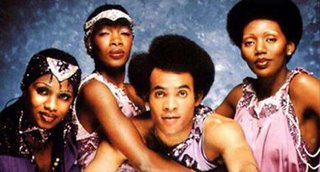
And of course there's that lovely spoken word bit in the middle, in which a strange man attempting to sound like an authority but really just coming across as pissed seriously steps up to tell us that "When his drinking and his lusting and his hunger for power became known to more and more people, the demands to do something about this outrageous man became louder and louder!"
Further listening: Falco's "Rock Me Amadeus" (also in German, of course, though Austrian in origin, and more New Wave than disco); ABBA's "Waterloo" and "Fernando"; Dschingis Khan's "Dschinghis Khan" (less popular than "Moskau" but actually about an historical figure which helps) as well as other songs such as "Samurai"...uh, I can't think of any more and I'm a bit bored.
Dan Zanes plugs history to pre-teens. He's on at the Melbourne Festival this year; I saw him on Sunday and it was a pleasant experience. He didn't play any of my favourite tunes, which are the bolshie depression era work-songs or the gospelly blues laments or the sea shanty-style drinkin' songs; I mainly like these because I think it's an excellent idea for a four year-old to ask his or her mother what's the origin of lyrics like:
Take the two old parties, mister
No difference in them I can see
But with a farmer–labor party
We could set the people free
Seriously?
What about the simplicity of:
Pay me, you owe me
Pay me my money down
Pay me or go to jail
Pay me my money down!
Or the 13 year old kid singing:
Well it's all for me grog, me noggin’ noggin’ grog,
all for me beer and tobacco.
For I spent all me tin with the ladies drinking gin,
Far across the western ocean I must wander.
Yes.
I interviewed Dan a little while ago and he said some stuff I liked. It's more than I expected. I'll just quote him verbatim.
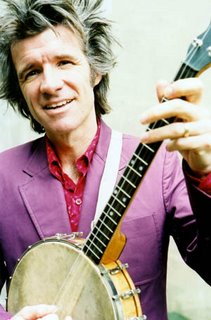
When my daughter was born I had this idea in my head of what I thought everybody was listening to. I didn't know anything about parents or parenting. I didn't know anything! I grew up listening to a lot of folk music, Leadbelly, Woody Guthrie, Pete Seger and all that stuff, and I just assumed that that's the kind of music that people were playing for their kids, just updated versions of all that. And I went into the record store to get some and it seemed like everything was tied into a TV show or a movie, it just felt very corporate. Not that there's anything wrong with that, but that was all I found.
And then I looked a little harder, and then there's always been great stuff for kids and families. So I eventually found lots of stuff, just not in the mainstream. But I didn't find that handmade sound that I was hearing in my head. For me, I was just trying to update Folkways Records. That was all I was really thinking about. Try and write a couple of good ones along the way, and make the kind of music that I used to hear, that made me want to play myself.
That's the name of the game, if you hear something and...you know, we played down at the Andy Warhol museum last week down in Pittsburgh, and you know, when you're around something that's so good, it makes you want to do it yourself. Looking at Andy Warhol's prints just makes me want to get out some paint and just get creative in the visual realm. So I grew up listening to music that made me want to make my own music and so that's the goal really, because I don't think we make nearly as much music these days as we could be and, you know the world is not a very peaceful place and it's not a very united place.
I know over here in the States there's a lot of fear and suspicion and it's a very divisive climate, and it's from the top down, really. I think music-making is the antidote to that. Music-making really brings people together. It's very social, it's very enjoyable, anybody can do it. It connects us to our past, it connects us to the stories that we can tell other people. If somebody else is connected to their culture that's different from mine then we've got something we can pass back and forth.
There's just all this insanity now about this whole immigration into the US, particularly from Mexico and the South, and it's just lunacy, you know. It's created this climate of fear and suspicion and I think that, really, people are coming here with so much to share. So much culture, so much music. And I think the more we make music with each other, the more we're reminded of that. And it gives us a sense of what life can be. So people might call it kids music or something, but for me, I call it social music. Because that's the name of the game, really, it's what we do with each other. But we're at that point in America where we're not a particularly musical society anymore. But I really think that could change. You know I'm not a big complainer, I'm just sort of calling it what it is. I really believe that that can change.
The thing that got me especially excited in the beginning was going to the park. A lot of the people here that are babysitters are from the West Indies, so we'd go to the park and hang out with these West Indian women and they would teach me songs. They were pretty cool about it, they were happy that somebody was asking these questions and was interested in their culture, and I was just thrilled that they were so willing to teach them to me, so we spent a lot of time together and a bunch of them ended up forming a group, and that group is on the first record, they're called the Sandy Girls.
That made me realise that a lot of this stuff was just here for the asking, it's a cultural goldmine, and it also made me think about my own heritage. You know, if someone were to ask me about songs that I grew up with, what would I really have to say? So it got me thinking too. Like I said, I don't feel like I do enough. Hopefully the next CD we do will be a lot of songs from Latin America, Mexico on down. That's really exciting me. But every day there's new ideas. Everybody's here. I just love good music. I love great songs, I love stories. It's all around me. It makes me so insane when there's this suspicion and this feeling that we should try and keep people out or make it hard to get here, to America. These people are what's making America great!
And so on. Good dude. Not a bad show, and the kids mostly seemed to be having a swell old time. But who knows, I'm not a two-year old. And this post has gone on way too long.
Sunday, October 22, 2006
Interval and The Bert Moment (Melb Arts Fest pt 6)
Quick review - what have we had so far? Well, we've had all manner of things, but variety hasn't exactly been the defining feature of this year's festival. In fact, the number of common elements linking shows has been surprising, seeing as how pundits were having trouble finding a 'theme' to this year's program and the festival director denied the existence of one.
If there was a theme, though, I'd say 'DREAM' pretty much sums it up. With the exception of one or two shows I haven't posted on yet, every performance I've attended has ended with me stumbling out into the auditorium rubbing knuckles in my eye sockets, blinking myself awake, and attempting to reconcile the previous hour or two with the realities of, you know, getting home. It's as if this year's festival has been calculated to turn the usual arts crowd into a horde of zombies shambling up St Kilda Rd, not groaning "BRAAAAIIIINNNNSSSS" but "AAAAAARTTTTTT". Or, in many cases, "WWWWWWTTTTTFFFFFFFF?"
Tonight I saw Japanese dance company Fluid hug hug's Rise:Rose, and as I watch my memories of the event rapidly recede in the rearview mirror I'm compelled to write something about the event. It featured three terribly adept dancers pulling every move possible, it seemed. The sparseness and control of traditional Japanese dance was tempered by the fluidity of contemporary practice, and even hip hop elements crept in with hand plants and subtle popping. But though there's no denying the skill of the dancers (amongst the best I've seen this year), it was one of those shows where I had no idea what was going through the choreographer's head when he put it together. Why this move, and not that? What's this sequence dealing with? What the hell is going on?
This confusion, mingled with the obvious abilities being showcased, put me into the state that's been the recurring theme of the festival, that dream-state I mentioned earlier. It's not sleep, exactly, but it's certainly a reduction in the beta waves, to get technical, and a major upping of the theta cycle.
It's as if these shows are designed to put you into that state where you're not quite asleep yet, but are ready to dream. As my plus-1 put it tonight, it's that moment where you're lying in bed thinking about stuff, with music playing softly in the background, and suddenly you snap to and realise there's no music playing. Or, as he put it more succinctly, "I feel a long way away from my feet."
I've been feeling that for a while, and I'm hoping to find a show that puts my feet squarely back in the picture. Not that I haven't been enjoying the festival so far, or that my feet are a pretty addition to any picture, but as the fat sheriff in the cult 1971 film Two-Lane Blacktop puts it:
"If I'm not grounded pretty soon, I'm gonna go into orbit."
Back when I was a teenager with bad hair, poor social skills and no dress sense, long before I became an adult with poor hair, bad dress sense and no social skills, I had what is known as “potential.” I suppose the downside of “potential” is that it usually leads to “potential squandered,” but there were at least a good few months there when people were willing to give that kid a chance, because they thought they saw something glimmering beneath the surface, a diamond-glint amongst the clay, and they felt the sudden urge to throw caution to the wind and take a gamble on some chump who might not have great hair, or dress sense, or social skills, but by gum he’s got that something. And maybe they were drunk.
Of course, as a teenager, I was also only dimly aware that things had actually happened before I was born (wars and perhaps dinosaurs, if my education serves me correctly). But history has a way of running up and punching you in the goolies, as I found out too infrequently.
At about 17 or 18 I was asked to perform in a play commemorating an historical moment in the history of Warrandyte, a small town on the Victorian coast. The event in question was the collapse of coal mine many decades ago; I played a young miner, Bert, who was trapped in the collapse alongside the many who died from the disaster. The play was nothing special, dramatically, but it had a major significance to many of the elderly townsfolk who recalled the incident from their childhood. And as I was leaving the auditorium a man of perhaps 80 stepped towards me and introduced himself. “I’m Bert,” he said in embarrassment. “I was you.”
It’s hard to say what responsibility a director has when dealing with a real historical catastrophe, especially when those who survived are still alive. These are the problems Lucy Guerin has faced with her latest work, Structure and Sadness, presented as part of the Melbourne Fest. Her show is dedicated to the workers who died in the collapse of the West Gate Bridge in 1970, but the show itself isn’t a dedication, or a recreation. It’s something more, and I think it’s a works.
Creating a dance piece centred on a real tragedy is a big ask, and Guerin has made a wise choice, I think, in going for an impressionistic response rather than a literal one. The work tries to evoke both the physical forces at play in the construction of massive structures as well as the human response to great calamity. I think it succeeds.
It’s hard to be objective about the end result since I’ve been following it for some time now (I was even thanked in the program, to my surprise). But having spoken to some of the people involved in the bridge’s collapse way back when, I think they’d be proud of the result. I hope that none of the dancers have a Bert moment. But it’s a pretty powerful moment to have, and I think that their Bert would have shed a tear during the show.
Insert Coin to Continue (Melb Arts Fest pt 4)

For some reason I had trouble hustling up a willing companion to accompany me to Robert Wilson’s A La Galaga. Why? The question really beat the urine out of me. I mean, here we have the chance to see a work by one of the world’s leading directors, arguably the world’s premier director of contemporary opera. The guy made Einstein on the Beach, which has surely earned its place in the pantheon of “on the” artworks (Kafka on the Shore, Fiddler on the Roof, Blame it on the Boogie). Sure, come the naysayers, it’s three hours long with no interval.
But look at the title! It’s Wilson doing Galaga! How can this be wrong? If I heard that they were touring Peter Brooks’ After Super Mario or Robert Lepage’s Eight Airs in the Key of Pong or, hell, even Barrie Kosky’s overrated The Insatiable Man of Pac, I’d be jumping onto the back of the couch, sending my dinner ($3 microwavable nachos from 7-11) arcing across the room to Pollock the wall, yelling at the top of my lungs something like “get me Ticketmaster on the dog-and-bone ANON!” before collapsing in a giddy heap and coming to in a congealing puddle of room-temperature salsa and not-quite-cheese as the realisation struck me Bruce-Lee-double-punch-style: I have no one to make such calls for me, and perhaps there’s a reason for that.
But it’s Galaga!

As a kid, I’ll admit, I hardly acted honourably during the whole Galaga/Space Invaders civil war which fractured the globe during the early 80s; I was the double agent, the lad who’d spit coins at any flashy number that came my way. I’d heard the propaganda: that the big G was just a cheap rip-off; that Space Invaders was the only ‘pure’ way, and that anything else would only lead to a life of sordid squalor and Russell Street arcade hanging out in-ing. But I didn’t care: give me bleeps and squiggles, blinking lights and ever-rapidly descending aliens, hope and loss for 20 cents a pop – I’d gladly get it wherever I could.
Three hours of Galaga? Nothing. Even as a twenty year old, after a decade hiatus, when I found a vintage Galaga machine at the old International Bar (now Ding Dong) in the city, I rediscovered my lack of ability but abundance of optimism in the game, frantically mashing those random buttons in the belief that I could stave off global annihilation for far less than the cost of a beer. And I found this through the wealth of friends and strangers who were eager to challenge me at that very same task.
Three hours of Galaga? That was just a warm up for us.
So where were these gallant button-jockeys now? Where were those looking to see their teen computer game addictions played out on Melbourne’s largest stage, by a director at the top of his game?
They were reading the program more closely, it seems. As it turns out, Wilson’s epic is titled I La Galigo, and it’s his rendition of an Indonesian creation myth that rivals The Odyssey in length and impact.
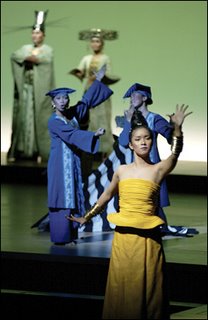
I found a friend, finally; D_____ was a frequent visitor to Indonesia in his youth, and knew enough of the language and culture to educate me well before and after the show.
Which was, itself, like a lot (if not all) of the festival as I’ve seen it so far. The best word I can find to sum it up is: interesting. Yeah, hardly a word that will have you cussing yourself for not booking tickets earlier, but that’s how it’s been. There’s been nothing that I’d rave to my friends about, and insist that they MUST see, but there’s been nothing that I’ve been tempted to walk out of, either. It’s all been rather intriguing, quite original, somewhat different, nicely produced and adequately attended.
Interesting.

Wilson’s saga is three hours, yeah. And it could be cut, I suppose. The initial sequence of performers walking slowly across the stage bearing traditional Indonesian artefacts as the onstage band plays distantly, not too dramatically, wasn’t an instant turn-off but felt unnecessary. Once the actual story itself kicked in, at least half an hour on, it proved fairly compelling, in the way that most creation myths are. There was war, prophecy, divine intervention, exploration, wonder, sex. The usual. And Wilson did a good job making the thing pretty pretty, though not super-pretty (I know his thing is making the backdrop lighting impressive, but he needs to expand the palette).
And the venue. We were obliquely notified that we were free to enter and leave the auditorium throughout the performance, in keeping with the fashion of Indonesian theatre. And god knows, at three hours, throughout an epic creation myth mostly conveyed without words, this would seem appropriate.
But we were at the Arts Centre, for a Melbourne International Arts Festival show, so the young couple immediately to my right were subjected to about 80 Sharp And Disapproving Glances by the older couple in front of me, as they giggled and talked during the first ten minutes (they walked out after that). Others occasionally spoke in hushed tones, but there was the generally stultifying air of a High Art performance throughout.
Which is fine, in context. But this show didn’t deserve such a context.
It deserved a showing in an open-air amphitheatre, with a large crowd coming and going, talking, commenting on and drawing thoughts from the goings-on onstage. It wasn’t a show for breathlessly absorbing: it was a show for engaging with, in the full sense of the word, for being a part of, in the way that audiences are so rarely these days. It should have been the Galaga experience, in which every paying audience member felt a vital and immediate connection with the story being told and the many people who are telling it.
It was, however, interesting.
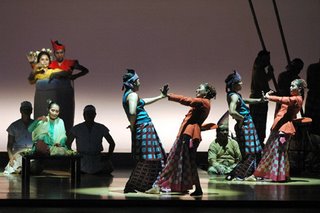
NB: If anyone wants to produce a show with all the interactive energy of an old-school video game, I’m right behind you. I imagine a Bosch-style mise-en-scene with dozens of actors onstage, each tethered by marionette strings which are controlled by an individual audience member. The audience, then, creates the performance we see, and its up to our creativity in conjunction with the performance abilities of the cast to make something wonderful. Perhaps impractical, though.
Thursday, October 19, 2006
Boarding Pass (Melb Arts Fest 06 pt 3)

I am a very good audience.
I am perfectly willing to sit motionless for hours at a time, watching something I'm only half enjoying. I will gladly sacrifice both armrests. I can uncross and recross my legs in absolute silence, or shift my body weight without a creak, and without rocking the seat of the poor fool in front of me. I try to sit as low in my chair as possible so as to maximise the sightlines of the people behind. I attempt to breathe inaudibly.
The Castellucci show I wrote about yesterday was performed, as far as I recall, in near silence. To be honest, I don't remember if there was music involved; I think there was some sound during the scene changes, but it was the kind of show you don't remember clearly. There was sound from the actions onstage, obviously. But there were also long, long periods where you could have heard the proverbial pin. I guess the reason I don't remember whether or not recorded sound was laid on top was due to that old John Cage dictum about the myth of silence, about how there's always sound, especially when you have an audience. Audiences make sound, and this is part of the performance, too, or at least the 'event' of which a performance is only one part. I love audiences; I loved it when a little boy behind me spoke up during a quiet bit in Warby's Monumental to tell his mother that he was hungry. Me too, kid!
But the chilled hush during the Castellucci piece was broken, for me, by a far more testing sound. At some indefinable point, the dude to my left began breathing loudly through his nose, and sounded sort of sinusy and blocked up, so I was watching the onstage proceedings with a soundtrack that sounded like a wheezing, desolate wind blowing across a craggy moor. Wheeeeeeeze. Pause. Wheeeeeeeeeeeze. Pause. Wheeeeeee- you get the picture.
And then a funny thing happened. The woman to my right picked up the beat, and began wheeeeeeezing in syncopation. Suddenly I was in the aural equivalent of a tennis match played by two lumbering giants with a bad case of the sniffles.
Hrriiiiiiiiisssssllllzzzzzzz....
Tssssniiiigggghhhhhhuuuuuuhhhhhh.....
Hrriiiiiiiiisssssllllzzzzzzz....
Tssssniiiigggghhhhhhuuuuuuhhhhhhk!
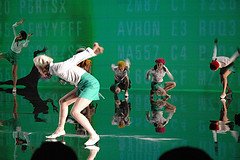
Not much room for quiet when last night's Voyage started up. Instead, the cataclysmic roar that Japan's dumb type do best, the kind that resonates at such thunderous and low frequencies that it feels as if every atom in your body is being shaken violently and you might just begin to disintegrate if it keeps up much longer.
How was the show? Well, hard to say. I think my +1 for the night put it best: afterwards, she said that during much of the performance, she was asking herself "do I like this or not?" And we both agreed that the question sort of became irrelevant after a while. It wasn't a show you liked, or cared about, or anything. It was a very similar experience to the one I had when I last saw the same group, about two years ago, I think. I vividly remember being struck by several moments in that show, but the rest of it is just a hazy, dream-like memory. Same thing last night. You emerge from the theatre rubbing your eyes, waking up and already feeling the experience starting to slip from your conscious mind into some dark crannies of your forgettory.
The group mix tech-heavy multimedia such as microscopic cameras, electronic soundscapes and carefully controlled lightshows and projections with contemporary movement: sometimes dance, but sometimes stretching the dance vocabulary to such an extent that the word doesn't really apply. The sequence of scenes presented had a few loose connecting themes, mainly to do with voyaging, air and space travel, and diasporic experience, but it was more often an impenetrable logic that structured the subject matter; often thematics seemed sidelined by the pure theatricality of the moment, an arm arced in a particular fashion reason enough for its own existence. Overall, even with the body-shaking score which sometimes erupted, the overall thing seemed carefully constructed in order to put you into a different state of attention, one where a small part of your brain was taking in the sights on offer and doing a little bit of meaning-making, while the other, less literal parts where sent of a voyage of their own, given licence to take flight and take you far away from a little seat in a large, darkened room. Coming back was a bit like stepping off a plane, the unfocused eyes and difficulty speaking and sense of soul-lag there as well. So, I wouldn't say that I liked the show, or that I'd necessarily want to recommend it. But I sure had a good trip, and some pretty vivid dreams when I finally went to sleep.

Wednesday, October 18, 2006
All About the Baby (Melb Arts Fest 06 part 2)
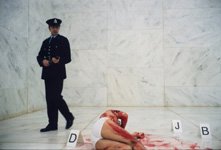
The show is just one part of a massive 11-play cycle (the Tragedia Endogonidia); each part was developed upon arrival in a city, and as a direct response to that city's history, culture, and so on. We got Brussels, and I read somewhere that Brussels was once the seat of legislative power in Europe or some guff like that, so themes of governance, institutionalised power and dominance run throughout this episode. But there's also a more generalised evocation of power and powerlessness centred on time, aging, duration, growth, decay, and hair loss.
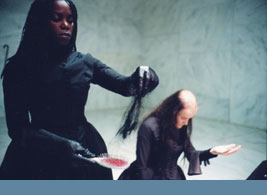
The show is made up a number of sequences, wordless all, played out in a massive white-marbled cube suggesting a museum, palace, cell or church (among other things). The scenes are densely cryptic, travelling in directions often quite unexpected; sometimes they don't really travel at all. The first, for instance, sees a cleaning woman slowly moping the floor, boredly, maybe absent-mindedly. BORING. Or not. I found it hypnotic after a while, and began watching the way that the arc of her mop sweeping across the marble created a kind of mandala effect after a while: she wasn't randomly swishing the thing around at all. I didn't know what it meant, and I suspect it might have meant nothing, but it gestured at the possibility of meaning. Sums up the whole show, that.
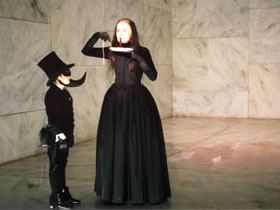
Now, it's nothing new to lay out a stack of signifiers and refuse us the ability to construct any kind of sense from them. Normally I can't stand that kind of theatre, since it's so hard to do well. But I don't think that's the result here. Castellucci's created a tragedy without a chorus to explain the events we're seeing for us. We're not being told why these events are significant, or how we supposed to interpret them.

Since the Greeks, the chorus has been a hugely influential tool in theatremaking, and you could say that later modes saw the chorus internalised into the drama itself, so that the language and staging and so on maintained its function. A piece of theatre usually, in some way, says "this is this" and then "this is why it's here before you". Castellucci cuts that out, which is a very different thing from cutting out meaning or significance entirely. What we see on stage are very dramatic and gripping events, but there's no commentary of any kind which forces us to interpret them in any given way.
It wouldn't work if the scenes produced weren't so provocative, I suppose. And if you did't find them so, you'd probably be pretty switched off by the production. But for me, the image of a live human baby maybe six or eight months old sitting alone and unattended on a huge stage, gurgling away merrily, noticing a toy and picking it up curiously, slowly beginning to register some painful thought or feeling and transforming its face into a mask of rage or disappointment, then just dropping it all and thinking about something else: I was absolutely enthralled by what I will gladly call the Performance of the Year. And upstage, a naive cut-out face propped up on the floor began to open and close it's mouth and eyes, reciting numbers in a garbled voice. What was the connection? Was it the child being taught by rote? Was it technology as dumb infant? Was there comparison and contrast or connections to be made?
In a way the automaton reminded me of the play itself: it was a narration without a narrative, a plot with out a story (in the Russian Formalist sense), it was the hollow decoration that delights with its movement but contains no deeper soul inside. Because it was hollow, it had that levity I was thinking about yesterday: it wasn't 1984, screaming "this is important!" It was useless in the best way, in the Wildean sense ("all art is quite useless", says Oscar, and I wholeheartedly agree with that complex suggestion). It's the laughing seriousness advocated by Sartre, too, the work which approaches the truth by revealing the floating and ephemeral and plain silly nature of any kind of truth.

Man, it was a good show. Or not, maybe.
Tuesday, October 17, 2006
Levitas (Melb Arts Fest 06 part 1)
The concept of levity is, I think, very important.
When the pope drops by Casa di Firenze to refresh his walk-in-robes, what happens to the outfits he throws away? Does he donate them to the poor, the homeless? If I'm ever asked for spare change by someone got up like a cardinal, I'll swear eternal fealty to the church, believe me. If not, where do those robes go? To the Vatican staff, so that would-be assassins stealing into the Holy City are inundated with popes stirring broth and mopping marble and chatting up nuns before the tabernacle? Are they burned in a ceremony bordering on the profane? Or is there a secret that's been kept hidden for centuries, something to rival the Da Vinci Code in its combination of intrigue and inconsequence, a cover-up for what happens to the things that cover-up the high-ups?
Yesterday I got styled. Agreeing to a work assignment of a potentially ill-advised character (my boss today actually uttered the words "I don't think I should be encouraging this predilection") I agreed to hand my image and good sense over to a professional stylist, his assistant, a hair and makeup artist and a photographer with an unhealthily good sense of humour. What was I thinking? Would I be transformed into some bronzed He-Man deserving of a laurel crown?

Or would I, like Fabio, end up looking like a fallen idol bashed in the grill by an errant goose? Worst-like, would I be found gurgling in a haze of hairspray and 'product', halfway to comatosis, a gaggle of colleagues wiping the gunk from my pallid face as I uttered the immortal words of Ghostbusters' Venkman:

He styled me.
You'll have to wait and see.
Last Thursday I was due to attend the opening of the Melbourne International Arts Festival's 1984. Work commitments prevented me from making it, and to be honest, I was kind of ok with that. I'd read reviews that repeatedly mentioned the word "shouty"; if you want to turn me off a show, that's pretty much the first button you need to mash. I can appreciate a lot of theatrical modes. Gimme some Theatre of Cruelty, a side serving of Theatre of Catastrophe, with a dollop of Theatre of the Oppressed for good measure. The appetite's there. But Theatre of Shoutiness? I've had my fill, thanks (subtext: fill=university).
I won't review 1984, since I clearly ain't seen it. And it wouldn't be wrong to say that my reluctance to check it out is due to its reported didacticism, its literalism, the way it takes an obvious point (uhhhh...fascism is, like, totally sucky) and yells it at you for two hours. There's a lack of levity, it seems.
But what's this levity deal all about?
Generally, I've always thought of myself as a big fan of levity's opposite, gravity. A production with weight, with an immanence that grounds it firmly in the earth, rather than presenting itself as something disposable, the flyaway hairs that resist the brush and you only hope won't be visible to outsiders; that's the thing.
But I don't know, really. Sure, last year's MIAF-sponsored presentation of Le Dernier Caravanserail was probably the most impactful show I've ever seen, and will ever see, and it was also a dramatisation of one of the most crucial crises to face the contemporary world (the situation of The Refugee).
And last Sunday's performance of Ros Warby's Monumental was an exercise in levity, despite the show's title. Warby is a dancer of immaculate precision, perhaps the most accomplished mover I've seen, every twitch and quiver a measured and immaculate thought embodied. The show plays with the classic, iconic balletic images of the Swan and the Soldier, but doesn't speak them, rather tickling our preconceptions to work against the grain. Warby knows her business, for sure; the show isn't an earnest plea for something-or-rather, but offers instead the kind of playful pointlessness only a master of the form can toy with. Ballet fans with intellect would find much to revel in here; I found it a skeletal dance, too light to gain a foothold anywhere I'm likely to be standing.
But isn't that the essence of levity? The opposite of gravity, the term signifies something impossible, the absence of weight, yet something equally sought (cos dammit, isn't zero-G the ultimate goal?!? No need to answer). Isn't the opposite of weight something purely theoretical? Can lightness achieve reality? Can levitas signify gravitas?
Romeo Castellucci's Tragedia Endogonidia finds the balance, in my opinion. I tend to agree with one judge, while finding myself at odds (critically speaking) with several others.
More to come.
Sunday, October 15, 2006
One of them meme things
At high school I… could never have envisioned the high-powered, jetpack-enabled future of grotto-dwelling party-goers and marathon macrame sessions which awaited me. Funny, I still can envision it. But time, as the Stones said, is on my side (NB: assuming immortality).
My first relationship was… Better than I could have expected.
I wish I’d never worn… that patchwork shirt that made me a pariah in high school dancing classes.
My mother told me… that hair would eventually grow over the scar which runs across my crown from one ear to the other. It never did, which is why I wear my hair long, so as not to frighten small children.
I wish I had... three more wishes. And a robot valet.
My most humiliating moment was... just a precursor to the many minor humiliations to come. Read about 'em here.
At home I cook… for anyone who will eat, as often as I can. Cooking as therapy is vastly underrated (see also: gardening; knitting; emotional house-cleaning; the meticulous preparation of tea; cycling through a park on the first warm day of spring, a balmy breeze caressing your cheek and the sun glinting off the teeth of smiling strangers; and, of course, dancing.)
My last meal would be… prepared by me for people who'd enjoy it.
I’m very bad at… relationships.
When I was a child… I once had a sudden and unexpected understanding of the way the universe fits together which I still recall vividly.
The book that changed my life is… written by Thomas Pynchon.
It’s not fashionable, but I love… pitching peeled grapes towards the gaping maws of partially-clad supermodels during cocaine-fuelled Eyes Wide Shut-style scenarios in remote Tuscan grottos. No, wait, that's probably quite fashionable. Sudoku, then?
Friends say I am… different things, depending on who you ask. Anything from the crazy, kooky one to the calm and centred observer. It's the parallax view, I think. Don't get it.
The song I’d like played at my funeral is… Another One Bites the Dust, hummed beatifically by the congregation.
If only I could… make everything better, for everyone.
The last big belly laugh I had was… Little Superstar. I laugh hard only a few times a year, and that worries me. But when I do, I find it's mostly, and consistently, inspired by the sight of someone unselfconsciously dancing in a totally radical way. I don't know what that means.
What I don’t find amusing is… Most forms of humour based on us/them dynamics, which perhaps relates to a) why I really laugh so infrequently, b) my routine education in an arts-based course and c) why I'm pretty boring to be around at times.
I’m always being asked… How old are you really?
If I wasn’t me… I'd like to know who it was, and how to get those ugly stains out (vinegar, apparently).
At the moment I’m listening to… Diana Ross' Upside Down.
My favourite work of art is… by Franz Kline.
If I were a car I’d be… getting outta here.
I often wonder… if krumping is just a passing cultural fad.
I often wonder (2)... if I'll make it to the age of 70 or 80, when I'll be able to sit on a porch somewhere with all the friends I've managed to retain, lovers and nemeses, the garrulous and the begrudged, the ones who never got it, but accepted it anyway and found a connection with me in that, at least, if nothing else, or just ended up on that damn porch while I was there and somehow bridged the gap between banana lounges with a withered outstretched palm or gave me, a stranger, that knowing smirk that says "we got away with it!"
We didn't get it, but by god: we got away with it.
TAG: Our Man and (H)Ausculture.
Friday, October 13, 2006
Get Outta Denmark
So I've decided to hand the next leg of the trip over to Waylon, and busy myself with cookin' up some grits to keep him happy. Take it away, boss.

Well howdy there, glad you could join us. You might remember that we last left our wanderin' Jackdaw in the ol' Dalby Hotel, a fine mess of a place if ever I seen one - an' I seen my fair share (suffering a debilitating addiction to cocaine throughout the early 1980s). But this ain't about me.
So here's our hero, rustlin' up the fire to get his sorry ass outta bed and back on that there road. When he hit the hay last night, he was sure fixin' to leave that damn broke down horse of his out there in the carpark, and to leg it the rest of the way every which way he has to. But look at 'im now:

He's thinking "durn it, that tootin' nag got me this durn far, and I'll be durned if I'm a gonna give up on him when the going gets rough!" So even though it might be no use to nobody as a trusty steed, it's still got enough of the ol' pack horse in it to make it outta Denmark.
So he saddles up the thing, strapping his bags all over it till you can barely tell what's under all that junk. And it's back out on the open road, where he walks with his burro past the wide fields and thick forests lining the way. It rains the whole way, but he ain't fussin'. Takes about three-four hours afore he finds the next town, little place named Naestved, and soon he's a-buyin' a ticket to the coast, where a ferry will be takin' him on south over international waters.
Now, listen up, y'all.

You might think from this image of the wayward stranger trudging into town through the driving rain, leading his hobbled horse by the nose and not sayin' a whole darn lot, well, you might think he was some kind of troubled drifter out on a mission of revenge, or runnin' from a dark past he refuses to name. You might be prospecting some leathery gunslinger whose hidin' a fistful of pain behind his no-nonsense, stoic demeanour, spoilin' for a Danmark death-run that'll help him forget, or die tryin!
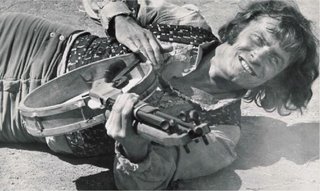
Well, that's where you'd be wrong, mister. See, turns out all that riding left him happier 'n he'd been in years, and you know what: he's still got that to this day. Whenever times are gettin' him down, he just remembers making his way through that strange countryside, so licked he could barely see the road ahead of him. And hell if that ain't some kinda good feeling.
I guess it comes down to the little pow-wow he has with the nice lady at the train station in Naestved. Come down from Copenhagen, he says, on this here little fella, so I'll be needin' a ticket for him too. "Rode from Copenhagen?" she asks.
Sure as the nose on his face.
"Why?"
He thinks about that. And if he's going to be honest with himself, it's the first time he really did think about it. People had been askin' him in other ways for a time now, but he'd never really had an answer. And now it's almost over, he still don't.
"I don't know. Just felt like it, I guess."
As he's about to board the train, the conductor comes running over. "You ain't takin' that on this here train," he says. But I bought a ticket! "Not on my train". So what, I just leave it here on the platform? "That, or you stay with it."

So there you go, partner. If you're ever in Naestved, keep an eye out for a lonesome looking bike on platform 2. Give it a good home, or fix it up so it's back on the road. I like to think some kid found it, some poor Danish country kid with no money for a ride of his own, but who knows. Last we saw of it was out the window of the train as it pulled out of the station, and soon it was gone.
When the train pulled in Rodby, he saw the ferry squatting there like some kinda bull toad. And he scanned the horizon to see that, yessiree, Rodby was just like every other town he'd been through: nothing there. And there ain't no way he was spending another night in another no-good wasteland of a town, so he determined to get on that boat, whatever it dang well took. When's the boat leave? he asked the woman selling tickets. "Two minutes." You take cards? "Not in two minutes." But I'm outta cash!

And then, when he least expected it, this kindly old woman he'd never met and never would again, bit her lip for a moment then stuffed the eighty dollar ticket into his hand. "Go!" she yelled. "Run! RUN!"
And run he did, dagnabbit! You shoulda seen that critter fly! Scootin' up stairs, hot-footin' it round blind bends and heck, his feet mighta hardly even touched the gangplank! That little act o' kindness was the last thing Denmark gave him, and boy was he grateful. And then he was gone.
Well, that's about it for me, and that's about it from him, too. We'll be shuttin' up the travel shop for a whiles now, seein' as how there's some big festival in town that's a-gonna be takin' up all his time. He'll probably get back to the usual point of this here place, which is writin' up all them shows he sees. But maybe one day he'll be back with tales of illegal Russian bars and riding through mountains and the place where the word for "yes" is "no". Till then, I'd like you all to join in me and my little pal here for a duet:
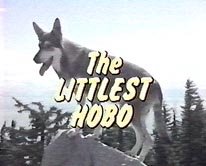 Maybe tomorrow, I'll want settle down,
Maybe tomorrow, I'll want settle down,Until tomorrow, I'll just keep moving on!
So if you want to join me for a while
Just grab your hat, come travel light - that's hobo style.
Maybe tomorrow, I'll find what I call home,
Until tomorrow, you know I'm free to roam!
Everybody now-
